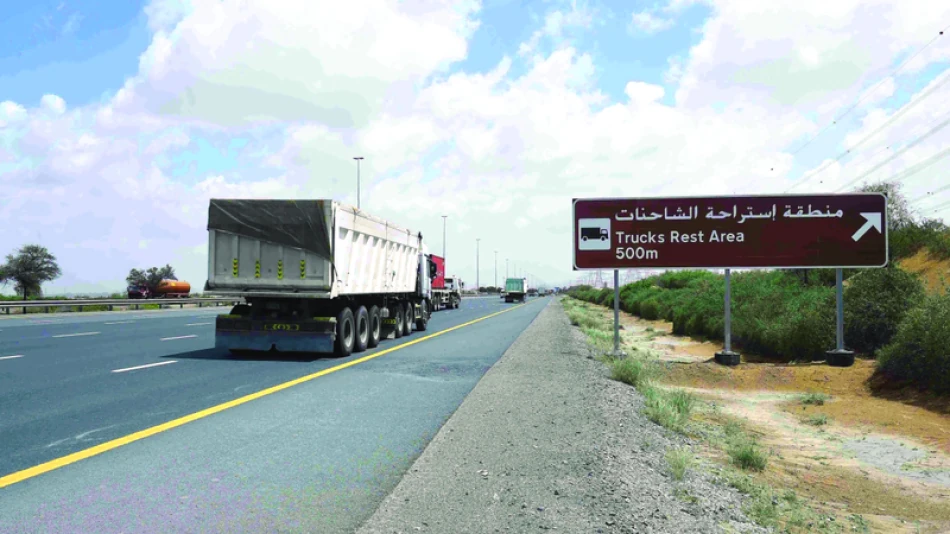
Dubai's Roads Authority Completes 14 Truck Rest Stops on Major Highways
Dubai Builds Logistics Infrastructure Empire with 14 New Truck Rest Stops
Dubai's Roads and Transport Authority has completed 14 truck rest stops across the emirate's main highways in partnership with ADNOC Distribution, serving approximately 150,000 trucks monthly. This infrastructure push reflects Dubai's strategic positioning as a global logistics hub and demonstrates how smart urban planning can address the practical needs of commercial transport while boosting economic competitiveness.
Strategic Infrastructure Investment
The Dubai Roads and Transport Authority (RTA) announced the completion of these facilities by the end of the first half of 2024, with four additional permanent rest stops currently under construction. Ahmed Al Khuzaimi, Director of Traffic Management at the RTA, emphasized that these facilities form a critical component of the logistical infrastructure supporting trade and transport movement.
Each rest stop includes prayer rooms, diesel fuel stations, commercial outlets, restaurants, truck maintenance workshops, and driver rest areas. The permanent facilities will feature motels alongside standard services, creating comprehensive support ecosystems for heavy vehicle operators.
Meeting Real Market Demand
The monthly usage of 150,000 trucks indicates substantial demand that was previously unmet. This volume suggests Dubai's freight transport sector has reached a scale where dedicated infrastructure becomes economically justified and operationally necessary.
Economic and Safety Rationale
Dubai's approach mirrors successful logistics hubs globally, where supporting infrastructure often determines competitive advantage. Singapore's strategic truck facilities and Germany's autobahn rest stop network demonstrate how comprehensive driver services translate into operational efficiency and safety improvements.
The RTA's focus on driver welfare—providing clean facilities, rest areas, and basic maintenance services—addresses a critical gap in commercial transport. Fatigued drivers represent significant safety risks, while inadequate facilities can lead to illegal parking and traffic congestion on main roads.
Strategic Location Selection
The authority selects locations based on accessibility, visibility, proximity to industrial zones and logistics centers, and traffic density patterns. This data-driven approach ensures maximum utilization while serving areas with genuine operational need.
Regional Logistics Competition
This infrastructure development occurs as Gulf states compete intensively for logistics dominance. Saudi Arabia's NEOM project and Qatar's expansion of transport facilities create regional pressure for comprehensive logistics ecosystems. Dubai's truck rest stops represent one element of broader infrastructure competition.
The partnership with ADNOC Distribution also demonstrates how state-linked enterprises can collaborate efficiently on infrastructure projects, potentially offering a model for similar developments across the UAE.
Integration with Traffic Management
The facilities address Dubai's truck traffic restrictions on main roads during peak hours. By providing safe parking during prohibition periods, the rest stops help enforce traffic policies while maintaining commercial operations. Variable message boards communicate restriction times and safety messages to drivers.
Future Expansion Plans
The RTA's development plans for additional facilities suggest confidence in continued freight volume growth. Regular meetings with shipping companies provide feedback mechanisms for service improvements and expansion priorities.
This systematic approach to driver satisfaction and operational efficiency reflects Dubai's broader strategy of creating business-friendly infrastructure that supports economic growth. The truck rest stops may seem mundane compared to headline-grabbing mega-projects, but they represent the practical foundation that enables Dubai's logistics ambitions.
For investors and logistics companies, these facilities signal Dubai's commitment to supporting freight operations through comprehensive infrastructure rather than merely offering tax advantages or regulatory benefits.
Most Viewed News

 Sara Khaled
Sara Khaled






